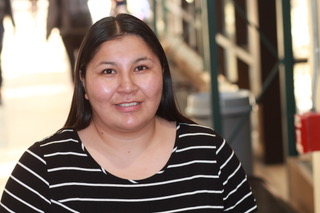
University of Manitoba PhD student Melissa Anderson.
PhD student receives Indigenous Scholar Award
Melissa Anderson intends to use bursary to improve stroke research
On April 3rd, The Heart and Stroke Foundation of Canada, Brain Canada and the Canadian Institutes of Health Research announced that University of Manitoba PhD student Melissa Anderson is among the inaugural recipients of the Personnel Awards for Indigenous Scholars.
This new program aims to increase the number of highly qualified trainees working in heart and/or brain research from Indigenous communities whose traditional and ancestral territories are in Canada. The Indigenous Scholar awards reduce financial barriers to enable outstanding scholars to focus on their studies, undertake a program of research, and engage with mentors as part of their training and development.
Anderson is Ininew, from the Fox Lake Cree Nation in northern Manitoba, and a PhD student in the Biomedical Engineering program at UM. Her research centres on positron emission tomography (PET) imaging, which, along with MRI, is used to provide visual damage assessments for victims of stroke. Her PhD research will be focused on optimizing PET and MRI imaging methods using the BrainPET.
Designed by Winnipeg-based Cubresa, a world leader in brain imaging technology, BrainPET is a PET imaging machine that can fit inside an MRI machine, allowing PET and MR images to be collected simultaneously, optimizing the image of the brain.
Her primary research goal is to help develop better PET imaging methods which would ultimately allow specialists to visualize the damage in the live brain and provide a more accurate understanding of the degeneration process.
Inspired by the experience of family members who have been victims of stroke and heart disease, Anderson hopes her research will one day help provide better understanding, detection and treatment of these prominent health issues, such as heart disease, renal disease and stroke, that are prevalent in First Nations communities.
Her long-term goal is to help develop imaging methods and equipment that can provide better understanding of neurological disorders. She hopes that one day she will be able to obtain a research position in a university and use her scientific expertise to provide more support for Indigenous communities.
“Congratulations to Ms. Anderson for receiving this prestigious award and forging a path to success for others in Indigenous communities,” said Mario Pinto, Vice President (Research and International). “I have no doubt that through her studies she will make a lasting positive impact on the lives of those suffering from these debilitating health issues.”
To learn more about the Heart and Stroke Foundation of Canada’s Indigenous Scholar Awards program, visit: https://www.heartandstroke.ca/what-we-do/media-centre/news-releases/fifteen-indigenous-scholars-win-funding-for-heart-and-brain-research-initiatives
Research at the University of Manitoba is partially supported by funding from the Government of Canada Research Support Fund.






